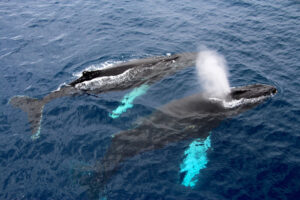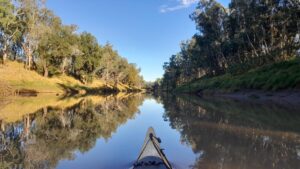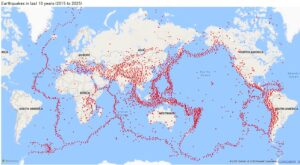Since our last update, rowers set six course records in the Talisker Whisky Atlantic Challenge, and multiple new ocean row expeditions have taken to the waves.
Talisker Whisky Atlantic Challenge (TWAC)
In the TWAC, soloists, pairs, trios, and quads race to complete the 5,000km crossing from Tenerife to Antigua. This year’s entrants set off on December 12. After 63 days, only three crews remain at sea: two soloists and a pair.
This year’s winners crossed the finish line after 34 days, 23 hours, and 42 minutes. The four-man Swiss Raw team of Roman Mockli, Jan Hurni, Samuel Widmer, and Ingvar Groza are the first team from an inland country to win the race.

We Are ExtraOARdinary. Photo: Atlantic Campaigns
This year, teams set multiple course records. We Are ExtraOARdinary cut a staggering seven days off the record for an all-female trio. Wild Waves smashed the previous record for a women’s pair by five days. Force Atlantic became the fastest mixed four to complete the race, beating the previous record by 33 hours. Atlantic Nomads became the fastest-ever mixed trio, finishing in 40 days and 37 minutes.
In addition to the course records, solo winner Lasse Wulff Hansen is now the first Dane to solo cross any ocean. And The Entrepreneur Ship, a pair of Guy Rigby and David Murray, set the record for oldest pair to row any ocean. Their combined age was 124 years and 301 days.
The winners from each race class are as follows:
Overall winners: Swiss Raw (34 days, 23 hours, 42 minutes)
Winning five: Five in a Row (36 days, 4 hours, 42 minutes)
Winning four: Swiss Raw
Winning trio: East Rows West (37 days, 17 hours, 59 minutes)
Winning pair: Two Rowing Finns (41 days, 11 hours, 14 minutes)
Winning soloist: Ocean Rower (55 days, 1 hour, 9 minutes)

The Entrepreneur Ship. Photo: Atlantic Campaigns
Mission Atlantic
Mission Atlantic is another event taking place in the Atlantic Ocean. The event is much smaller and only open to serving members or veterans of the military.
The organizers stress that it isn’t a race but that they just provide support for teams wanting to row the Atlantic independently. The 4,815km route runs from Gran Canaria to Barbados. Two crews set off on December 22.
Atlantic Dagger: This four-man crew completed their row on February 8, after 48 days, 4 hours, and 17 minutes at sea.
In the last few weeks of their row, the temperature was so hot that resting in the cabins became unbearable. They tried leaving the hatches open while they rested to let in a breeze, only to get soaked by unexpected waves. They kept high spirits by having, for example, friendly competitions to see which pair recorded the highest pace. But near the end, they admitted that it felt a bit like the Groundhog Day movie, the same thing over and over.

Atlantic Dagger makes it to Barbados. Photo: Chris Martin
Cockleshell Endeavour 2021: This four has covered 4,300km of the journey. They decided to take a more direct route than Atlantic Dagger, but the gamble did not pay off. Though they led initially, strong trade winds soon slowed them down.
Though they have struggled at times, hitting bad weather that the other team managed to avoid, they are now in the home stretch.
And just in time: Yesterday, they ran out of basic food. Now they only have protein shakes and emergency rations left. They hope to arrive on Friday, but with only 700 calories a day to keep them going, it will be a hungry last few days.
Independent Atlantic Rowers
United We Conquer: Jack Jarvis (UK) is rowing alone from Portugal to Miami. On February 1, after 60 days at sea, he passed the halfway point of his journey. He recently wrote, “From flying fish…to different weather…it has certainly been a whirlwind of a trip.”
To date, he has rowed 4,200km and has faced some pretty unfavorable conditions. Jarvis has gained a celebrity following too. He has received messages of support from famous footballers David Beckham and Gary Neville, and rowing legend Steve Redgrave.

Jack Jarvis has rowed 4,200km so far. Photo: Jack Jarvis
One pair give up
Rö over Atlanten: Swedish pair Soren Kjellvist and Mans Kampe wanted to row from Portugal to Antigua. After 1,690km and 23 days at sea, they have aborted.
From the beginning, they suffered from seasickness, and their autopilot broke just hours after setting off. After a few weeks of good weather, things began to change. Just one day from Tenerife, the winds shifted and started pushing them northwest into the North Atlantic.
They managed to reach Madeira but had to be towed for the last section. By this point, they were a month behind schedule. With their budget, resources, and available time running out, they decided to make Madeira the endpoint of their row. “We are relieved, frustrated, happy, disappointed, and exhausted all at the same time,” they said.
Shecando 2021: Karen Weekes (IRE) is rowing solo from Gran Canaria to Barbados. She hopes to become the first Irish woman to row the Atlantic alone from east to west. She began on December 6 and has covered 4,000km, 81% of her route.
After some early storms and a few days stuck in her cabin, she has had no further problems and is speeding toward the finish line.

The wind has been pushing Forget Me Knot in circles. Photo: Forget Me Knot Atlantic Row
Round and round they go
Forget Me Knot: This trio started their 5,900km Atlantic crossing on January 25 from Portugal. They hope to make it to French Guiana while beating the crossing record of 50 days.
In their first week, they suffered from extreme seasickness and had to make repairs to their autohelm. Strong winds have pushed them off course and around in circles.
The wind continues to play with them. Every few days, it eases up and they try to make the most of it. Then it pushes them around again. They use their para-anchor when necessary.

Rame Océan ready to set off. Photo: Rame Océan
Rame Océan: Patrick Favre (FR) and Matt Dawson (US) are rowing from Restinga El Hierro, the southernmost tip of the Canary Islands, to Guadeloupe. They started on January 31. Two weeks in, they remain in good spirits.
In their first few days, the sea was calm. If they had any complaint, it is that the beginning was too placid. There was almost no wind at all. So far, they have had some mild seasickness and a broken water pump. After tinkering for a day, Favre managed to fix it.
Atlantic Roar: Emma Wolstenholme (UK) began a solo row from Tenerife to Barbados on February 3. She hopes to break the current record of 49 days, 7 hours, and 15 minutes. Ten days into the crossing, she has covered 600km.
The scariest moment so far occurred on her fourth night, when her automatic transponder went off. She was on a collision course with a 157m oil tanker. Happily, the Liberian-flagged ship maneuvered to a safe distance.

Victoria Evans begins her Atlantic row. Photo: Sea Change Sport
Sea Change Sport: The newest boat to take to the sea. Victoria Evans (UK) began a solo row from Tenerife to Barbados on February 11. Evans is very clear about her goal: She wants to become the fastest female to solo row the Atlantic. This makes her the second woman this season to attempt this particular record. In her first full day, she has rowed over 100km and is feeling positive about her chances.
Pacific Ocean
Erden Eruç: Eruç started his row on October 6 in California. He is aiming for Hong Kong. At 11,000km, it is the longest ocean row currently underway. He has already covered 6,000km and has now paused for the second time on his journey.
In January, he decided that he would stop in the North Marianas to resupply. A nonstop crossing to Hong Kong would have meant resupplying at sea.
He eventually settled on Guam. But although the weather was good, the U.S. Navy had planned a live-fire exercise just north of Guam at exactly the time and place when he was approaching.
Luckily, after some frantic calls, they shifted the exercises to the opposite side of the island. He landed in Guam on February 12.
Eruç is the first recorded person to row from Hawaii to the Marianas. After months on his boat, he has lost 14kg. His wife is now flying to Guam, and he is looking forward to spending Valentine’s Day with her.
While on dry land, he has to fix his water pump and replace two oars he lost in a storm. He also must decide whether to continue his journey or re-launch it next season because of pending bad weather.

Erden Eruç arrives in Guam. Photo: Guam Sports Network
Rowing and cycling
Zerow-Emission: Julen Sanchez is attempting to row from Portugal to Miami. His row is part of a larger challenge. He wants to complete a zero-emission journey that connects Europe and America. He began by cycling 2,800km from Paris to Portugal and is now rowing the 7,500km from Portugal to Miami. Once he reaches Miami, he will cycle the final 2,500km to Pittsburgh.
At the end of January, Sanchez passed the 4,000km mark of his row, but it is now difficult to track his location. His third (and last) phone has broken, so he cannot communicate directly with his family or send GPS positions. Despite this, he has decided to continue. He will send updates through the other vessels he encounters.






